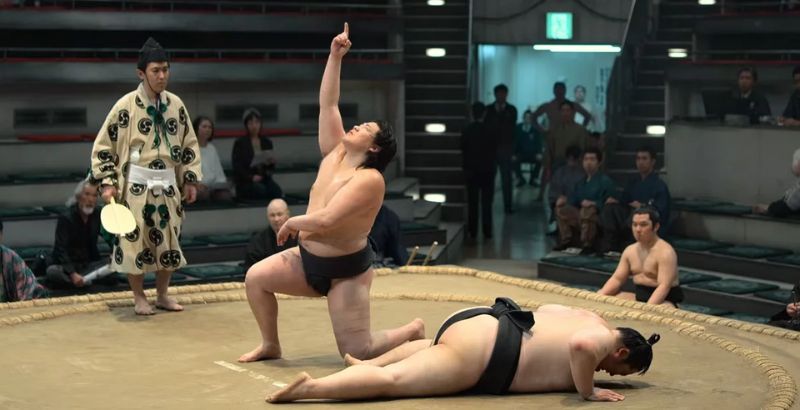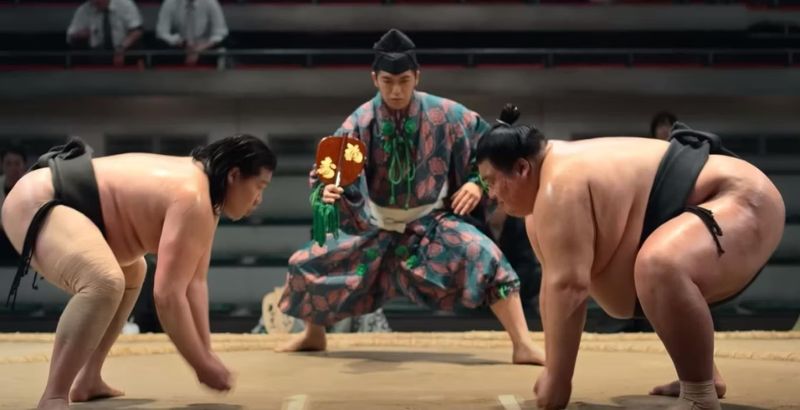
Sports dramas allow the audience to understand how skill is only one part of an athlete’s journey. They often peel back the layers that we see from the stands and instead showcase the pain and determination involved in training, the trauma that often leads some to dedicate their lives to a sport, and of course the darker elements involved in any organized competition. In those ways, Sanctuary is a perfect exploration of sport as a narrative tool to build the complexities of people and situations.
A religious ritual as much as a sporting event, Sanctuary takes its name as a reference to the sanctuaries created and guarded by the sport. Directed by Kan Eguchi and written by Tomoki Kanazawa, this eight-episode Netflix series unhesitatingly pries open the world of sumo, illustrating the ambition and fight in one delinquent, Oze Saruzakura (Wataru Ichinose), and his road to becoming yokozuna, the highest rank a sumo wrestler can achieve. This puts him squarely on a collision course with a voiceless wrestler carrying his own dangerous secret. Sumo, while positioned as a gorgeously reverent sport, is also shown through the lens of the men who participate. And with them comes a focus on money, women, power, and of, course fame.
As a look into sumo wrestling, Sanctuary captures some dark elements of the sport by looking at the ways dohyo (the ring where the bouts take place) hierarchies lead to bullying and favoritism. But at the same time, the series explores sumo in a way that highlights the difficulty of actually becoming great in the sport. It details the training processes and the way that wrestlers must push their bodies beyond exhaustion.
What looks like a simple lift of the leg to those who are watching is a fundamental skill that requires years of dedication and training in order to connect it to the rest of sumo movements. The series manages to showcase the importance shiko as a foundational move to audiences who don’t know about sumo by using it as a metaphor for Oze’s larger story. Sanctuary doesn’t just look at the drama and trauma surrounding our lead character, but it also takes the time to show the audience the athleticism involved with rising in the ranks of the sumo world.

Additionally, there is an admiration for the power and strength in a sumo wrestler’s body that comes through in every training and bout. When the bodies move, the camera pans tightly on their nearly naked bodies to show the depth of muscle on them. We see the power of legs crafted by years of dedicated training, backs broad with shoulders that push hundreds of pounds out of the dohyo and across the room.
The beauty is found in the violence of the sport in the same way that filmmakers capture the beauty and skill of boxing. While this is a typical element shown in sports stories whether live action or illustrated, to see bodies that don’t fit the typical beauty standards of strength shown in this light is stellar – not just because of the representation of showing athletes of this size, but because it’s all done to progress the narrative at the same time. The bouts themselves are fantastically shot, often slowed down to a great effect in order to capture the moments of impact and struggle. While this comes from direction, it also comes from the actors in the dohyo themselves who each went through intense physical training under the instruction of Hollywood experts and a coach and nutritionist for Olympic athletes to transform their bodies and learn the skills of sumo.
Sanctuary taps into emotional storytelling and uses an athletic goal as a way to channel larger elements and themes in the story. For our lead, who loves to fight, sumo is an outlet for his ability, but it soon also becomes a necessity in his life as he continues to push himself to make money to save his father. Sumo becomes more to him and that journey of finding his own kind of respect for the sport is the core of what makes you root for him.
In the first half of the series, Oze is entirely unlikeable in just about every way. But so are those around him, with the exception of his loving father. He has to pay for his mother’s choices to keep the family afloat. While this is a reason for his behavior and callousness toward the world, the choices he makes to showboat and belittle everyone around him also ensure that this reasoning is never an excuse.
He is an awful person, mad at the world, and he actively chooses to stay that way. That said, his love of his father and his child-like approach to the world is what keeps him grounded enough to make sure that the audience never truly turns on the protagonist as a character. He may be brash and frustratingly mean, but the way he’s taken advantage of by those he wants to care for him hurts to watch.

By leading with a deeply flawed protagonist, Sanctuary tells a story that pushes beyond athletic motivations and demonstrates how the world around you shapes who you are. And more specifically, how you can grow and change when you make the choice to do so. In the last of the season, we get the chance to see Oze crumble under the weight of a crushing defeat. After being maimed in the dohyo, Oze is a specter of himself. His body is broken, and the physical trauma is baked into his memory every time he subsequently steps into the ring. But Oze’s trauma and fight in the ring isn’t the only thing we see.
The Ensho Stable and its sumo wrestlers are put through the wringer by a crooked establishment that is looking to break them. While the series does a lot with its characters to talk about the honor and respect that sumo brings and the necessity to have those two qualities along with dignity in a bout, Sanctuary also highlights the very ways in which that’s possible when pushed too far and when ultimately politics are at play as much as sport.
The only misstep that the series makes are how it chooses to introduce new characters and how it leans too much into absurdity when it should lean in on the drama. When new characters are introduced, the audience is given no formal introduction or notification as to whether something is a flashback or happening in the present. This makes some moments slightly hard to comprehend when first introduced into the narrative, but ultimately, the storyline does pay off excellently.
A sports drama that pushes its characters and its audiences, Sanctuary is a phenomenal series. The beauty, the spirituality, the violence, and the politics of sumo are all on display in this excellently crafted Netflix series. If you’re a fan of sports stories, this is one to watch immediately.
Sanctuary is streaming now, exclusively on Netflix.
Sanctuary
-
Rating - 8/108/10






